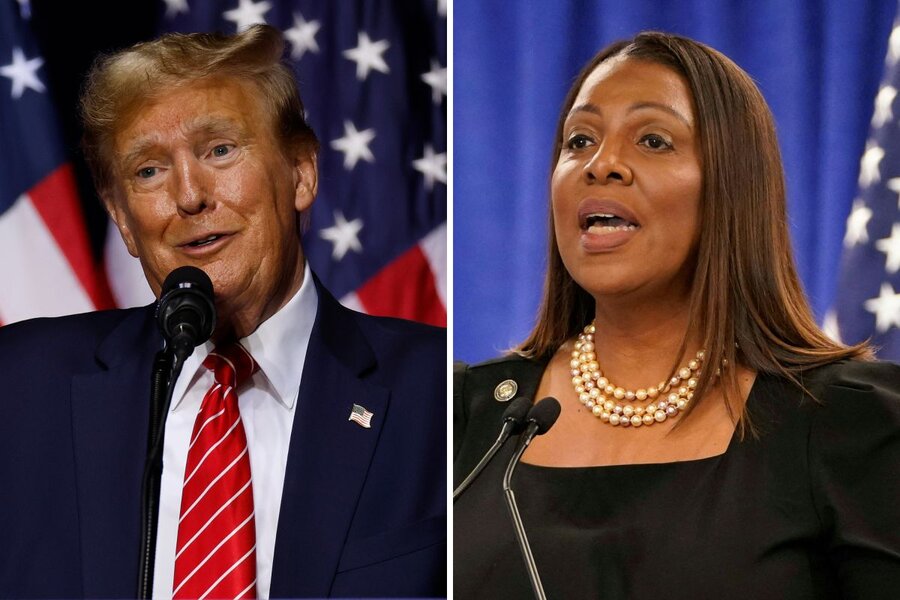Lawyers working for New York Attorney General Letitia James’s office made a request on April 4 to broaden the oversight of the Trump Organization. They cited a defendant’s admission of perjury as the reason for this appeal.
In a separate letter, state attorneys voiced their opposition to the suspension of the execution of the $454 million judgment against former President Donald Trump. This objection was based on the $175 million bond that Trump had posted.
A hearing is set to take place on April 22 in the courtroom of New York Supreme Court Justice Arthur Engoron.
In 2022, the Attorney General filed a civil lawsuit against executives of the Trump Organization for allegedly inflating figures on financial statements from 2011 to 2021. This action was taken to address claims of defrauding lenders and insurers, as well as the state.
President Trump, his sons Eric Trump and Donald Trump Jr., former comptroller Jeffrey McConney, and former CFO Allen Weisselberg were named as defendants in the lawsuit, along with various holding companies associated with the Trump Organization.
In February, Justice Engoron passed judgment, ordering a $464 million post-interest disgorgement, with the majority of this sum to be paid by President Trump. Additionally, the defendants are prohibited from conducting business in the state, and the existing monitorship on the Trump Organization has been extended for at least three more years.
In a separate criminal case against President Trump, Mr. Weisselberg accepted a plea bargain. This deal required him to plead guilty to perjury in his testimony for the civil fraud case.
State attorneys argue this warrants an investigation.
Kevin Wallace, a senior enforcement counsel with the Attorney General’s office, proposed two modifications to the monitorship order. These changes would permit the monitor, former judge Barbara Jones, to share information with one party without the other party being present.
The state pointed out that the monitor was previously granted permission to share information without both parties present, as outlined in a November 2023 order. They requested that this same language be included in the current order.
The state has requested that Ms. Jones be “directed to investigate certain issues surrounding the recent perjury plea by defendant Allen Weisselberg.”
At the trial, Mr. Weisselberg gave testimony regarding the Trump Tower triplex penthouse. As a result, the state has requested that Ms. Jones be assigned to review the correspondence that was mentioned during his testimony.
The 10,000-square-foot Trump Tower triplex penthouse was once reported as 30,000 square feet in a Forbes article. This discrepancy arose from a mistake made by Trump Organization executives, who testified to the error. Forbes had compared the claims with city records and concluded that the Trump Organization was inaccurately representing the size and value of the penthouse.
In 2016, Mr. Weisselberg sent an email to Forbes addressing the square footage dispute, involving another employee to verify the figure. He testified about this in a pre-trial deposition and on the witness stand.
The state argued that even after Mr. Weisselberg pleaded guilty to perjury, “Defendants still have not taken any steps to fulfill their affirmative obligation to take ‘reasonable remedial measures including, if necessary, disclosure to the tribunal.'”
The state has requested that the monitor be authorized to collect files, asserting that the defendants have “withheld relevant and responsive information.”
The state has requested that Ms. Jones review the electronic files collected for production to the Manhattan District Attorney, who is prosecuting the case in which Mr. Weisselberg took a plea deal. This review would include examining the reasons behind the production or non-production of certain files.
They requested this be done within two weeks.
In a separate letter, state attorneys objected the “sufficiency” of the $175 million bond that President Trump posted to delay the execution of the judgment.
An appeals court ruled that President Trump could post $175 million instead of the full $464 million, following arguments from his attorneys. They had claimed that it was a “practical impossibility” for sureties to fill a bond that large, explaining that they had engaged in weeks of negotiation with more than 30 sureties who refused to accept real estate as collateral.
State attorneys argued that the defense did not provide specific details regarding why sureties would not fill the bond. They suggested that President Trump’s assets might not be as valuable as he claimed.
On social media, President Trump claimed to have nearly $500 million in cash. However, he expressed a preference for using this money on his campaign rather than having it tied up in an appeal.
The state is currently protesting against the exception that was granted by the appeals court.
“Defendants or KSIC [Knight Specialty Insurance Company] shall file a motion to justify the surety within 10 days of the service of this notice, failing which the bond shall be without effect, except that the surety shall remain liable on the bond until a new undertaking is given and allowed,” the notice reads.
Share your thoughts by scrolling down to leave a comment.













